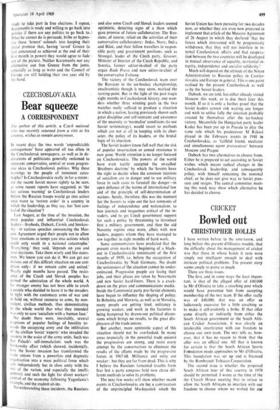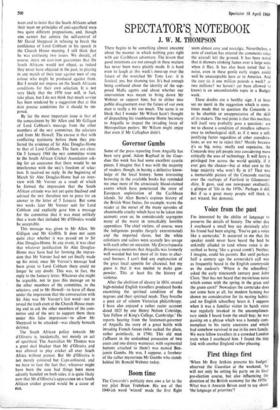Bowled out
CRICKET CHRISTOPHER HOLLIS
I have written before in the SPECTATOR, and long before this present d'Oliveira trouble, that the difficulty about the management of cricket was that those in whose hands it rests were simply not intelligent enough to deal with intricate political problems. The present story seems amply to prove as much.
There are three issues.
The first, and in some ways the least impor- tant, is that of the alleged offer of £40,000 to Mr d'Oliveira to take a coaching post which would have prevented him from accepting membership of the rem team. If the offer really was of £40,000. that was an offer so ludicrously excessive for a little coaching as to make it self-evidently a bribe. If that offer came directly or indirectly from either the South African government or the South Afri- can Cricket Association, it was clearly an intolerable interference witb our freedom to choose our own team. The MCC tells us, how- ever, that it has no reason to think that the offer was an official one. All that is known for certain is that the South African Sports Fofindation made approaches to Mr d'Oliveira. This foundation was set up and is financed by the Rembrandt Tobacco Corporation.
The second issue is whether the proposed South African tour of this country in 1970 should be permitted. I wrote at the time of the the Church House meeting that to refuse to allow the South Africans to interfere with our freedom to choose whom we wished for our
team and to insist that the South Africans select their team on principles of anti-apartheid were two quite different propositions, and, though one cannot but admire the self-control of Mr David Sheppard in refusing to break the confidence of Lord Cobham in his speech in the Church House meeting, I still think that he was confusing two issues. We should„ of course, insist on cast-iron guarantees that the South Africans would not object, as indeed they never have objected in the past, to playing in any match of their tour against men of any colour who might be produced against them. But I would not impose on the South Africans conditions for their own selection. It is not very likely that the 1970 tour will, in fact, take place, but I do not think that much service has been rendered by a suggestion that at this date precise conditions for it should be im- posed.
By far the most important issue is that of the concealment by Mr Allen and Mr Gilligan of Lord Cobham's message from the other members of the MCC committee, the selectors and from Mr Howell. The excuse is that with conflicting testimony before them they pre- ferred the evidence of Sir Alec Douglas-Home to that of Lord Cobham. The facts are clear. On 5 January 1968 the MCC committee wrote to the South African Cricket Association ask- ing for an assurance that there would be no interference with the mcc's freedom of selec- tion. It received no reply. In the beginning of March Sir Alec Douglas-Home had an inter- view with Mr Vorster as a result of which he formed the impression that the South African attitude was not yet quite finalised and advised the Nicc therefore not to press for an answer to the letter of 5 January. But some two weeks later Mr Vorster sent for Lord Cobham and explicitly gave him a message for the committee that it was most unlikely that a team that included Mr d'Oliveira would be acceptable.
This message was given to Mr Allen, Mr Gilligan and Mr Griffith. It does not seem quite clear whether it was passed on to Sir Alec Douglas-Home. In any event, it was clear that whatever justification Sir Alec Douglas- Home may have had for forming the impres- sion that Mr Vorster had not yet finally made up his mind, once Mr Vorster's message had been given to Lord Cobham there could no . longer be any doubt. This was, in fact, the reply to the January letter. Whatever else might be arguable, not to pass this message on to the other members of the committee, to the selectors, and to Mr Howell—to leave all these under the impression that the conversation with Sir Alec was Mr Vorster's last word—not to reveal the truth even at the Church House meet- ing and to ask the other members of the com- mittee and of the MCC to support them there under this false impression—to allow Mr Sheppard to be attacked—was clearly beneath defence.
The South African policy towards Mr d'Oliveira is, incidentally, not merely an act of apartheid. The Australian Mr Thomas was a great deal blacker than Mr d'Oliveira and was allowed to play cricket all over South Africa without protest. But Mr d'Oliveira is not merely coloured but Cape-coloured, and we have to face the fact that, whatever might have been the case had things b*n more adroitly handled on both sides, it is quite likely now that Mr d'Oliveira's appearance on a South African cricket ground would be a cause of riot.











































 Previous page
Previous page